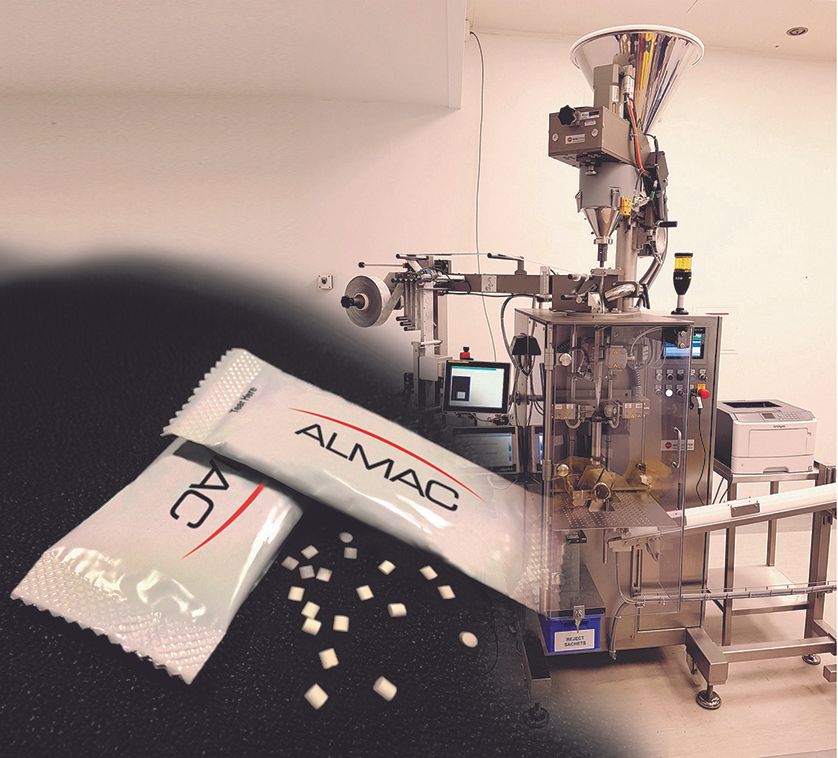Pediatric drug-development generates innovation in packaging and formulation
A manufacturer chooses Almac Group for commercializing minitablets in stickpacks
The ‘stickpack’ (left in photo) is a single-use package holding minitablets. The machine at rear is part of the packaging process. Credit: Almac

Almac Group, in partnership with a US biotech client
and supported by Merz, a world leader in the design and fabrication of stickpack sachet machines, has developed a flexible pediatric dosage form consisting of minitablets filled into stickpacks using a robust manufacturing and filling process suitable for routine commercial manufacture.
As a consequence of the EU Paediatric Regulation (EC 1901/2006 and EC 1902/2006) and the US requirement for inclusion of Paediatric Investigation Plans (PIP) in all new Marketing Authorizations, the demand for quality-driven CMOs with relevant knowledge and experience in the development and commercialization of pediatric formulations is increasing. In recent years, there has been a notable shift away from the traditional route of administration for pediatric medicines, namely oral liquid formulations, to solid oral dose formulations such as granules and minitablets. In fact, recent clinical studies have demonstrated that for children, aged between six months and six years, minitablets provide equal, if not superior, acceptance rates when compared with sweet-tasting syrup formulations, similar to those that have been historically used for pediatric patient populations.
Almac has been developing, manufacturing and packaging solid oral dose products for more than 40 years and has previously commercialized several adult presentations for a market-leading US-headquartered client. Of particular importance to the client was Almac’s experience with delivery of both clinical and commercial solutions from one integrated site at Craigavon, Northern Ireland. Proven experience in the development of pediatric formulations was also a critical factor in placing the work with Almac.
Almac was tasked with developing an immediate release pediatric formulation to be packaged in a compliant, easy-to-use pack format. From the outset, the experienced client and Almac teams worked together to identify a target product profile and determine the best pack format for the product, one that would provide an economical commercial solution whilst also providing a high degree of fill accuracy in a consumer-friendly package. The solution that best fitted the client’s compliance and marketing needs was a “minitablet in stickpack” presentation.
“In both Europe and the US, unit dose packaging is becoming the format of choice for both pediatric and geriatric populations,” notes Brian Eastwood, head of business development (EU) for Almac’s Pharma Services. “The stickpack offers a versatile, unit dose packaging option, which can be used to pack multiple dosage forms (i.e., powders, granules, minitablets, liquids and creams). They offer a convenient, easy to administer solution for children (via sprinkling onto a solid or liquid food substrate) ensuring delivery of an accurate unit dose and thereby improving patient compliance.”
Product, process development
From previous experience, Almac’s formulators were aware of the challenges involved with the manufacture of minitablets. The surface area/weight ratio of minitablets is significantly higher than that of normal size tablets leading to higher ejection forces during compression, therefore, during development, higher levels of lubricant were added to the compression blend formulation to offset any negative “sticking” issues that could potentially arise. The tablet design was also critical to the success of the project and was influenced by the proposed downstream activities (i.e., filling into stickpacks). Shallow convex minitablets have better uniform density distribution throughout the core, which can lead to a more robust compressions process. However, the expert team also knew that deep convex minitablets roll more effectively, and therefore, are more suitable for tablet counting technologies commonly used by sachet filling and encapsulation machine providers.
Utilization of suitable compression equipment and tooling is also a key factor for successful delivery of minitablets. Multi-tip tooling is expensive so it is important that a reputable supplier with proven experience in multi-tip tooling design is chosen. Recessed dies are also advisable to protect punch tips. Effective control over the feedframe is critical as tablet ejection can be challenging. This requires an optimized setup, with precise adjustment of specially designed scraper blades being critical in limiting tablet jumping.
Similarly, the choice of sacheting machine is critical as this ultimately controls the unit dose being administered. With that in mind, Almac, in partnership with our client, identified the Merz SBL-50 as the stickpack machine most suitable for the project needs and for the future needs of Almac’s client base. This machine is a single-lane unit with a counting system that can operate at up to 80 cycles per minute.
The key to project success was Almac’s extensive experience with similar investment projects. Multiple visits to the Merz facility, in conjunction with multiple visits by Merz engineers to Almac’s site, ensured that all aspects of the equipment’s installation, qualification and ongoing processing were discussed and addressed. Open three-way communication between the client, Almac and Merz allowed for seamless transfer of ideas and knowledge, and ensured a stickpack solution suitable for the client’s needs was delivered on budget and within pre-agreed timelines.
Through the formulation and process development stage, Almac was able to design a minitablet with characteristics built upon an acceptable trade-off between robust compressibility and effective processibility during the downstream sachet filling operation. Utilizing Almac’s in-house Engineering team, Almac designed and fabricated a unique ejection blade with a cover to avoid tablet jump during the compression process. This, along with modification of ejection cams to optimize ejection height, resulted in a robust compression process suitable for commercial scale manufacture of the client’s product. For this project, 37 tip multi-tip punches were fabricated, allowing Almac to produce minitablets at rates up to 550,000 minitablets per hour.
Project management
As this project involved transitioning a development project through to commercial readiness, Almac assigned two dedicated, on-site project managers, one specializing in formulation and process development, the other with many years experience in technology transfer and ongoing management of commercial supplies. Single-site integration of development and commercialization resources, including technical, analytical, quality and project management, ensured scientific continuity and simplified effort, saving time and expense whilst reducing vendor management and mitigating risk to the overall project.
“Almac has experienced a significant increase in sachet enquiries over recent years, with projects ranging from high-volume, adult generic sachet products to low-volume, pediatric stickpack presentations,” concludes Eastwood. “Stickpack presentations also offer our clients the opportunity to develop and manufacture novel reformulations in aid of line extensions to their existing product portfolio. It is an area where we see potential for continued growth and one where Almac will continue to invest to meet the needs of our clients.”
From Almac’s perspective, the key factors in the success of this project were:
- working with a CDMO with development and commercialization expertise in pediatric formulations
- same-site development and production capability to ensure scientific continuity
- early determination of target product profile and packaging format experienced project managers.
